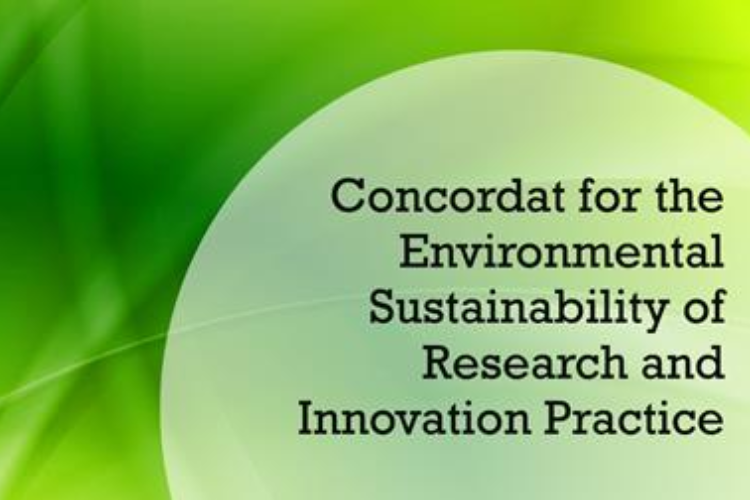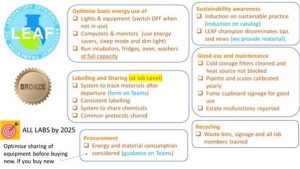
What a difference a year makes… The sustainability train has finally left the station…
Blog by Maggy Fostier, Associate Dean for Environmental Sustainability in FBMH
A year ago, I attended the Royal Society conference on Sustainability in the research and innovation endeavour (report on their website). I had a wonderful day learning about progress to green research in so many fields: chemistry, life sciences, clinical sciences, and pharmaceutical industry, and meeting like-minded people. The last panel discussion with funders however was disappointing: we all had expressed the need for more drivers from the funding bodies to deal with the urgency of climate change, but the panel was split on what to do or how to do it.
Fast forward to April 2024, at the Joint Conference on Research Outputs – MRC, Greener NHS and NIHR, the tone was completely different, and the day was energising. The session opened with the panel discussion with funders and everyone applauded the Concordat publication and the clear move from funding bodies to ask for sustainable research. We then heard excellent research talks providing evidence for the validity of their greener practices, and the panels facilitated pragmatic discussions to move forward.
So what is it all about…
On April 2024, a voluntary environmental sustainability concordat co-developed by more than 25 organisations across the UK research and innovation sector was launched. The concordat represents a shared ambition for the UK to continue delivering cutting-edge research, but in a more environmentally responsible and sustainable way.
The concordat is aimed at all organisations in the research and innovation sector (Research Institutions and funders). Concordat signatories and supporters commit to progressively embedding environmental sustainability into all research and innovation practices. An initial group of signatories have joined during the launch, and others are called on to join them. The ambition is to create meaningful, and long-lasting impact to reduce the environmental impacts of carrying out research.
Signatories to this concordat agree to the following six areas where they commit to taking action at a whole institutional level and collectively across the sector to deliver real change by 2050:
- Leadership and system change
- Sustainable infrastructure
- Sustainable procurement
- Emissions from business and academic travel
- Collaborations and partnerships
- Environmental impact and reporting data
The aims of the concordat are to:
- have visible and credible leadership for environmental sustainability at all levels within institutions and across the research and innovation sector – from organisational leaders to individual researchers and from those funding the ideas to those delivering impact
- ensure research and innovation is carried out in an environmentally sustainable way, aligned to the science of climate change and ecology and signatories are transparent about environmental impacts of research and innovation and are open to collaboration and shared learning
- establish new ways of working so that institutions, researchers, and innovators continue to achieve a global reach and deliver world-leading impact in research and innovation using a climate conscious, low carbon approach, taking advantage of new ideas from across all disciplines, wider enterprise, and new technologies
- ensure net zero or near-net zero carbon infrastructure is being used to deliver research and innovation (with scientifically robust carbon sequestration where absolute zero carbon is not possible)
- support robust decisions made in resourcing research and innovation projects and data, based on circular economy principles and life cycle costing, with the need for responsible sourcing demanded all through supply chains
- promote a shift to the greater use of reusable products, innovative developments in single use materials and to have reduced the use of fossil fuel-based products being used and disposed of by those carrying out research and innovation to only those areas where there is no viable alternative.
UoM is soon to start discussions to join. This concordat is very well aligned with our Sustainable future strategy, so it should not request any or much changes to our current plan. Our target to have 100% of our labs with a LEAF accreditation by 2025 fits within the 6th priority: environmental impact and reporting data.
Some signatory funders, Wellcome and CRUK, are already requesting evidence of sustainable research as part of their funding process, so ensure you get a LEAF champion and attend training. It is easier than you think: LEAF focuses on generating quality science (so as not to waste experiments), it helps with lab organisation and efficiency, and it is likely to save money on consumables: what’s not to like…
LEAF 101: What is LEAF?
- LEAF stands for Laboratory Efficiency Assessment Framework and is an accreditation tool developed by a consortium of scientists at several UK institutions.
- It has been selected by UoM and many UK and overseas Institutions to make their lab greener.
- There are 3 levels and the criteria for each level and bronze is summarised below.
Who can be a LEAF champion and time commitment:
- Anyone in a lab can be a LEAF champion: PhD students, experimental officers, technicians, postdocs, and even PIs themselves. We believe in fostering a collaborative and inclusive approach to sustainability.
- The time required to reach bronze will vary depending on starting point in the lab, but a LEAF champion commits to 1-2 hrs a month plus an initial training session. It may take less time than this.
- To sign up, please complete this Qualtrics form
- If you encounter barriers, please contact Maggy with details.
Ethos and benefits.
- LEAF is centred on performing good quality science to avoid unnecessary experiments, optimising sharing of resources and reviewing procedures to avoid waste – saving the planet and usually some money.
- Following these actions, LEAF champions report a better organisation in the lab and more collegiality, leading to a greater efficiency and science quality which is either as good or better.
- We have 3 blogs from LEAF champions in our FBMH Sustainability good newsletter from Oct 23 The Oct FBMH ES Good Newsletter (see page 5)
Support: We offer:
- A training workshop for all LEAF002 – see Training & Development Profile (manchester.ac.uk)
- Tours of labs with silver/gold award
- A sustainable lab network where we share resources and progress and help each other.
- We have also piloted an induction for bronze, silver and one for master students. Work will be carried out over the summer to offer them both online and in person from September. We are also developing an induction to learn how to calculate and report on impact.

To find out more about Environmental Sustainability: visit the Faculty’s intranet page, website, read our ES Good Newsletter or contact srbmh@manchester.ac.uk . For more information on Environmental Sustainability at the University watch this short film or visit their website.

0 Comments